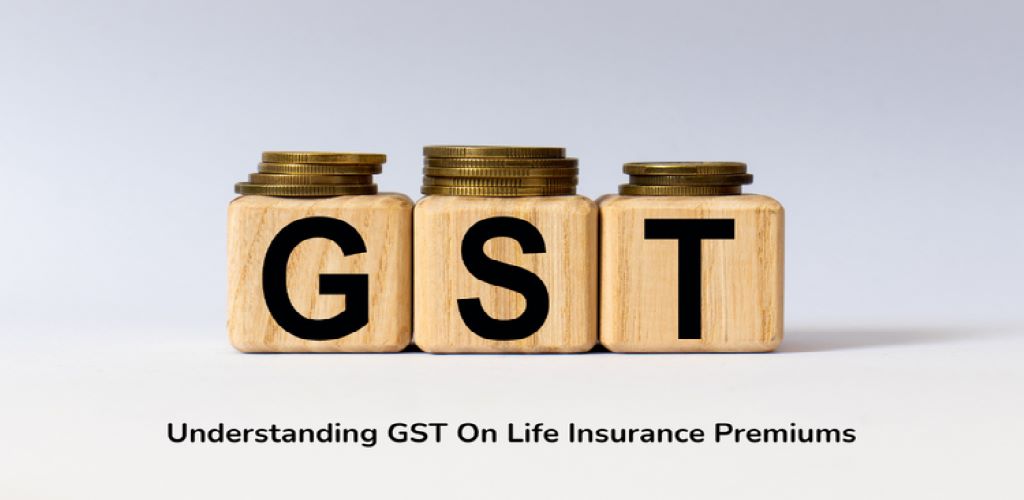Since the implementation of the GST (Goods and Services Tax) in India on July 1st, 2017, it has drastically affected the taxation and economic services industry. It became a subject of extensive conversation overnight because it affected almost all sectors, including life insurance premiums, with its associated rules. The GST, which is an all-inclusive multi-stage, destination-based tax system, replaced all other indirect, complicated, and fragmented tax regimes leading to a nationwide move towards a unified market. For instance, VAT, excise duty, and sales tax, among others, were some indirect taxes eliminated by the GST regime. This has simplified compliance issues among different sectors resulting in more transparency and economic integration being achieved.
According to PIB’s data, this year’s April saw an all-time high of INR 2.10 lakh crores of Gross Goods and Services Tax (GST) collections. This signifies about 12.4% year-on-year growth driven by the increase in domestic transactions by 13.4% and imports by 8.3%.
Importance of life insurance
As mentioned above, the changes imposed by GST have also affected the life insurance premium space. As a key component of financial management planning, it mitigates risks and ensures long-term savings, thereby offering financial security and stability to policyholders and their families. It also serves as a precautionary fund for unpredictable purposes in cases of policyholder death, critical illness, or disability.
So, given the critical nature of life insurance and the far-reaching impact of GST, it is essential to understand how this tax regime affects life insurance premiums. But before that, let’s dive deeper into why this unified taxation system is required.
Understanding the necessity for GST
Unlike direct taxes that do not involve transfer of liability, indirect taxes come with a transfer of liability. For instance, VAT imposed by a shopkeeper is passed on to a consumer, thus increasing the price of the product endured by the customer. On the other hand, GST has eliminated the cascading effects of various taxes. Furthermore, its implementation has enabled ease in calculating payable tax and streamlined the entire operations in the taxation process.
Is tax applicable on life insurance premiums?
In India, life insurance premiums are subject to taxation for the policyholder. It is important to note that tax on life insurance premiums is distinct from income tax deductions on premiums paid. The taxation system in India is divided into two main types: direct and indirect taxes. You pay income taxes as a direct tax on your earnings. This includes your wage, professional income, rental income, and so on. When you file your taxes every financial year, it is called filing income tax. Sections 80C and 80D of the Income Tax Act of 1961 provide you with the benefits of tax deductions for life insurance contracts. Deductions of up
to INR 1.5 lakhs are available on all insurance premiums paid during the year. Nevertheless, GST is applicable to life insurance policies.
Impact of GST on life insurance premium
A deeper look at the effects of GST on life insurance premiums is necessary. Before discussing this topic, it is imperative to comprehend how life insurance policies function. Essentially, there are three kinds of life insurance that one can select from:
– Term insurance plans
– ULIPs (Unit Linked Insurance Plans)
– Endowment policies which comprise money-back plans and a lump sum payment at death or upon maturity or regular payouts.
Prior to the implementation of GST, premium payments or ULIPs were referred to as service tax, and each case was charged 15%. These rates have now been replaced by GST, which was imposed at 18%, thereby leading to an increase in premiums.
On the other hand, the implementation of GST mandated considerable adaptations within the insurance industry. To comply with the new structure of taxation, insurance firms had to reinvent their systems and processes, which required substantial time and resource investment. At the same time, insurers had to comprehensively recalibrate their pricing standards to accommodate this altered tax scenario so that their products remained profitable and competitive. The shift from different rates across states to a uniform tax rate at the national level profoundly impacted the competitive environment of the insurance sector.
Moreover, eliminating regional tax disparities has made the insurance industry more equitable across the country. GST can potentially stimulate fierce competition amongst insurance providers, which may result in innovations by different companies as they try to set themselves apart from each other within a unified marketplace. Consequently, policyholders may benefit from varying types of insurance products as well as lower premiums in the future.
Calculation of GST
GST comprises the tax charge for the service provision under the life insurance policy, thus replacing the services tax, so the calculation goes like this:
The gross premium is less the amount allocated for investment or savings for the benefit of the policyholder who is made aware of it.
For single premium annuity policies:
GST is calculated at 10% of the premium.
However, in other cases, the first year’s GST is calculated at 25% and 12.5% from the second year onwards on premiums charged. Therefore, as far as GST on life insurance premiums is concerned, 25% of the first-year premium and 12.5% premium for subsequent years are assessed for tax purposes. Thus, if an endowment plan has a premium of INR 20000, then the 18% GST rate on the life insurance premium will be applied to the 25% premium, which would mean INR 5000 in the first year, while within the next one, it would mean INR 2500, excluding single premiums and term insurances, discussed hereinafter.
GST on Term Insurance:
If the entire premium paid by the policyholder gets to the risk covered under life insurance, the GST charged by the insurer is 18% on the entire premium.
The effect is a straightforward increase from 15% to 18% compared to the preceding situation. Since this has been passed on to the consumers, policyholders have to exercise caution regarding the premiums stated on the policy and whether the GST charges are included or not and then make their decision.
Can you save taxes on life insurance premiums?
Although premium costs of life insurance policies might have surged due to the GST, there is still an array of tax deductions available in India to help you lower income tax payments. These deductions can help you obtain tax breaks on premiums paid for your life insurance policy as well as the related GST incurred against them.
Two major tax deductions that enable one to reduce their income tax in India, mostly on life insurance premiums paid, are Sections 80C and 80D of the Income Tax Act of 1961. Your total eligibility for deductions under section 80C for life insurance includes all insurance premiums, including those that are based on GST up to a limit of INR 1.50 lakhs. Besides, if you chose a health rider with your life insurance policy, then additional premium deductions are given by Section 80D.
For instance, if a health insurance policy is bought at 30 years of age and the sum insured is INR 10 lakh from any insurance company, in such a case, the premium payable would be INR 7,843 with a GST of INR 1,412. Here, 18% of GST applies to the basic premium, where a total premium will total INR 9,255. In another instance, if the same policy was bought by a person having attained 50 years of age, then it would cost them a basic premium of INR 17,782 plus GST charges amounting to INR 3,200. The total premium payable is INR 20,983.
In both instances mentioned above, the amount charged by GST on basic premiums so far could help one avail of the tax-saving deduction benefit as stipulated by section 80D. Thus, in both cases, one can claim a total premium of either INR 9,255 or INR 20,983, according to section 80D. The amount spent towards tax-saving deduction depends on the limit for investment outlined within any one specific sub-section from 80D.
Benefits of GST for life insurance buyers
When opting for a policy, whether life insurance or general insurance, one can expect an increased policy price because of the Goods and Services Tax (GST). This will enhance competition among the insurers because they are likely to drop rates in a bid to attract buyers by reducing costs associated with policy issuance and other factors that contribute to the overall price of the insurance. Moreover, they will improve the level of service provided while purchasing insurance products or filing claims. Consequently, purchasers buying insurance plans can benefit, as they focus only on price by frequently overlooking other variables.
On this note, buyers need to recognise that premium is not the only consideration when buying any type of policy. The protection offered by any sort of insurance (be it car or health) from unforeseen events affecting your loved ones is what makes it paramount, along with the policies’ terms and claim processes that are available from the insurer. Due to GST imposed on life insurance premiums, insurers might enhance their offerings through improved service quality and, subsequently, ensure better customer experience during purchase moments.
Final Thoughts
The GST regime for taxing life insurance premiums will likely undergo further refinements in the future. Policymakers may consider introducing more granular tax slabs or exemptions on particular categories of life insurance products to increase the penetration of these services in India.
Therefore, it is important that consumers remain aware of tax consequences associated with diverse insurance products while making strategic decisions that align with their financial goals and risk profiles. We may expect to have further innovative products and pricing strategies that cater to consumer preferences while effectively steering the taxing environment in the insurance sector, whose growth is still ongoing during the GST era.







